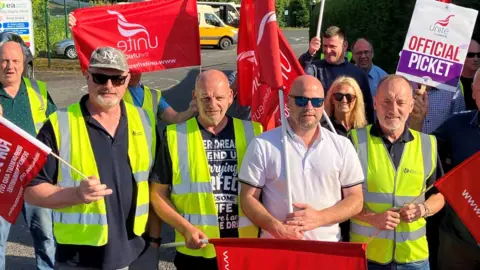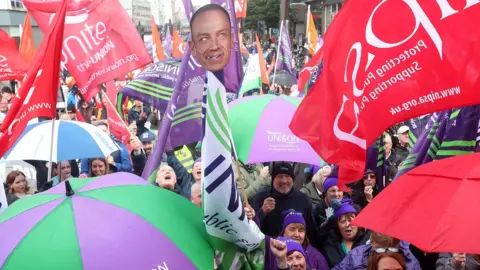Sunak says Strikes in NI could be avoided by Stormont return
 BBC
BBCThe prime minister has said public sector pay disputes in Northern Ireland could be resolved "rapidly" if the Stormont executive was restored.
Rishi Sunak was speaking after Unite confirmed it would join 14 other unions across the public sector in a major strike on 18 January.
Unite's deputy regional secretary David Thompson said frustration and anger had built up among unions.
Unions have billed it as the biggest strike in the history of NI.
Mr Sunak said "significant progress" has been made in talks with the Democratic Unionist Party (DUP) and there was "now a very good basis" to revive the power-sharing institutions.
He was speaking in the House of Commons during Prime Minister's Questions.
Northern Ireland's devolved government collapsed in February 2022 after the DUP withdrew in protest against post-Brexit trading arrangements between Northern Ireland and Great Britain.
The party has been seeking further legal assurances from Westminster of Northern Ireland's place within the UK internal market.
In December, Northern Ireland secretary Chris Heaton-Harris said those talks had "effectively concluded" and offered a £3.3bn financial package for Stormont if an executive is restored.
Mr Sunak said with the government's financial offer for Northern Ireland, there was "a real chance to restore the executive, resolve pay for public sector workers rapidly, and get Northern Ireland and its public services moving again".
The DUP did not decide to end its boycott despite the government's offer in December.
Teachers, nurses, health workers and civil servants will join transport workers in the "generalised day of action".
Unite said 8,000 of its members would take part in the industrial action as part of an ongoing pay dispute, including 2,300 Translink staff.
'Under-investment'
Mr Thompson told the BBC's Good Morning Ulster programme that he acknowledged the action would affect the public.
"I would ask this question: is the impact on the public next Thursday greater than the decades of under-investment in our public services? I would suggest no," he said.
"The under-investment has created havoc in our public services across Northern Ireland and has impacted everybody within Northern Ireland.
"We now have a secretary of state who has made it clear just before Christmas that he has the money, he's just not willing to pay it.
"It seems he's using people as a bargaining chip in a game of politics which is absolutely wrong."
GMB and Siptu members at Translink will also take part in the strike.
Translink workers from all three unions held four days of strike action in December, leading to major disruption to bus and train services.
The general secretary of Unite, Sharon Graham, said: "Unite will not allow the livelihoods of workers and the funding of public services to be used as a bargaining chip by this government."


Public transport workers joining strike action next Thursday is not unexpected.
Unions had warned last month of further disruption in January in their ongoing dispute over pay.
Four days of strike action by Translink workers across three weekends in December had a huge impact on retail and hospitality because it was the busiest time of year for Christmas shoppers and partygoers
It led to cancellations and lost sales that business owners told us they were unlikely to get back.
A Thursday in January, however, won't have the same impact on those sectors as it's a quieter time for both.
It is more likely to affect workers who rely on public transport for their commute, or children going to school.
That's not to say next Thursday won't be as disruptive - the scale alone with tens of thousands of public sector workers out on picket lines means it absolutely will be.
But the sharp end of the disruption is likely to be felt in schools and hospitals, rather than by private sector businesses as was the case in December.
It's difficult to assess the economic impact of public sector strikes here because we don't gather data in the same way as Great Britain.
However, Dr Esmond Birnie at Ulster University's Economic Policy Centre who has taken a look at how the picture here compares suggests NI in recent months has been much more strike prone than GB and that next week's action will only consolidate that position.

The pay issue has led to a series of strikes by healthcare staff, civil servants, teachers and other workers.
A Northern Ireland Office spokesperson said the secretary of state and the government had no authority to negotiate public sector pay in Northern Ireland.
"It is for the relevant NI departments to negotiate pay policies," the spokesperson said.
"The secretary of state has expressed his disappointment that a new executive was not up and running to take the offer on the table and deliver it for the people of Northern Ireland before Christmas.
"It is now for the NI parties to come together, restore the Executive and begin to address the challenges facing the people of Northern Ireland, including public sector pay."
 Pacemaker
PacemakerWhich unions are striking?
A total of 15 unions have announced they will be taking action on 18 January:
- British Dietetic Association (BDA)
- Charted Society of Physiotherapists (CSP)
- GMB
- Irish National Teachers' Organisation (INTO)
- Society of Radiographers (SoR)
- Siptu
- National Association of Headteachers (NAHT)
- National Association of Schoolteachers and Union of Women Teachers (NASUWT)
- National Education Union (NEU)
- Nipsa
- Royal College of Midwives (RCM)
- Royal College of Nurses (RCN)
- Ulster Teachers Union (UTU)
- Unison
- Unite
These unions represent about 173,000 workers, although not all will be on strike.
